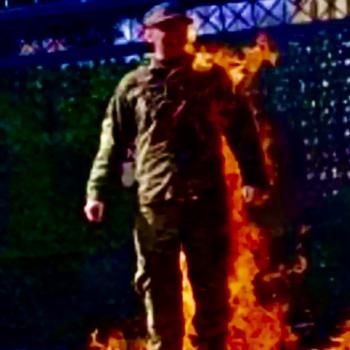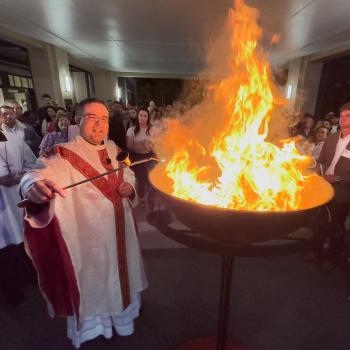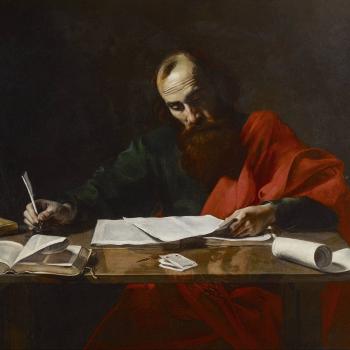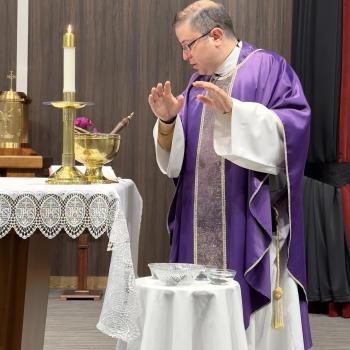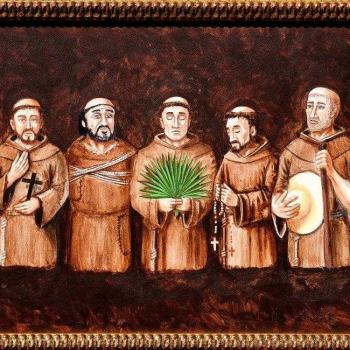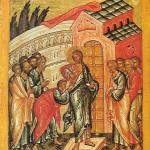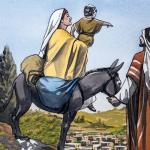This is a paper I wrote six years ago on the relationship between Pope Paul VI and President Lyndon Johnson that developed over issues regarding the Vietnam War. This post is long, but I hope you find it interesting. I have placed the footnotes at the end of the paper, for a full bibliography contact me. If you found the article useful, please leave me a comment telling me what you thought and what you’re working on, it’d be interesting for me. I’d appreciate it!
At the beginning of the anti-communist involvement of the United States in Vietnam, the Untied States did not have formal diplomatic relations with the Vatican, yet this lack did not impede President Lyndon Johnson from purusing Pope Paul VI for help to resolve the conflict. Johnson considered Paul VI a strong ally because the Catholic Church was a fervent enemy of communism as indicated by Pope Leo XIII’s late 19th century encyclical Rerum Novarum (1891), and was a persistent voice calling for peace in the world evidenced in John XXIII’s Pacem in Terris (1963). In addition, Johnson found the Pope’s international relations with communist countries instrumental to finding an honorable end to the ongoing war. Despite the Church’s support of the United States’ intentions, it did not agree with its bombings over North Vietnam, creating tension between their leaders. The nations’ contact peaked on December 23, 1967 when Johnson made a quick visit to the Vatican to implore Paul for help. Four months later in 1968, the Vatican proved influential in bringing Hanoi to Paris to begin peace negotiations. (1)
Pope Leo XIII denounced socialist states in his 1891 encyclical Rerum Novarum. In the encyclical, Leo XIII systematically proved socialism and communism contrary to human nature and proposed instead a state of duties between classes based upon Christian charity. He argued that these governments deprived man of the natural right to be rewarded for his labor especially through the ownership of private property. He asserted that socialism replaced the authority of the father in the family, which is the smallest societal entity, with the state, thus destroying the fundamental piece that kept families together. Socialism hurt those it claimed to aid by allowing power-hungry men to rise to power from where they could exploit the working class.
The Pope continued by proposing a state constructed by mutual agreements between the working and owning classes. The classes should respond towards each other through certain duties while always recognizing the dignity of each individual. The state should concern itself with the affairs of the rich and poor alike while avoiding greed and envy. Leo called for the creation of workingmen unions where members would help each other through Christian brotherhood and charity. These unions would strive to satisfy the material and spiritual needs of its members. Leo held his proposal would serve to fight social evils from industrialization, re-establish Christian morals, and bring about state laws in accordance with God’s eternal law. (2) The contents of the encyclical paralleled American policy towards communist nations in the 1960s. The stance of the Catholic Church on communism at the outbreak of the conflict in Vietnam was clear since the Church had openly condemned it. Johnson expected Paul VI’s support against communism now that they shared a common enemy.
In Pacem in Terris, Pope John XXIII described the new order of the world of 1963 in the midst of the Cold War between the Soviet Union and the United States. John harkened back to Leo’s emphasis on the dignity of every individual by stating that each human being had rights and duties that protected him and bound him to other people and to the state. Based on these rights and duties, John constructed a structure for society that reflected human nature and recognized the importance of peace. John praised the world in three specific socio-political advances, suggested three initiatives for every nation of the world that applied primarily to communist nations, and condemned Cold War policies the Soviet Union and the United States practiced.
The Pope pointed out with satisfaction that the economic and social conditions of working men across the world had improved. Along with this improvement, the role of women in politics had increased. Lastly, as European empires crumbled in Africa and Asia, he commended the growing number of nations that were becoming independent and were no longer subject to foreign powers. Next, without accusing communist nations explicitly, he called for every nation to write down and to incorporate fundamental human rights into its constitution. Communist nations neglected the dignity of each individual using their citizens as tools of the state, thus this initiative may have been specifically intended for communist states. Following this, he requested each nation to have a constitution establishing a planned juridical order. Finally, he encouraged nations to use the terms rights and duties to articulate the relationship between the state and its members. After calling for unity among races and aid for political refugees across the world, he requested the Soviet Union and the United States to reduce their stock-piling of armaments, to ban nuclear weapons, and to act in accordance to reason, not force. John XXIII believed that if nations followed these points, wars and fears would cease and the peace all men long for would reign. He believed that the founding of the United Nations was a good sign of the world moving in this direction and that little by little, the peace God wills for all mankind would be achieved.(3) John’s idealistic desire to achieve peace on Earth corresponded to Johnson’s yearning to end the conflict in Vietnam. Johnson wanted to find a peaceful resolution to Vietnam by the end of his presidency, and he trusted Paul VI would aid him in achieving it.
The opening of the Catholic Church towards the communist world after the Second Vatican Council (1962-1965) surprised the United States’ State Department, which until then had considered the Catholic Church an adamant antagonist to communism and now worried that the Church was becoming sympathetic to communist ideals. The Catholic Church supported nationalistic independence movements in Africa, appointed native African and Asian bishops and cardinals, maintained links with the Catholic hierarchy, activists, and organizations in communist states, dialogued with the Orthodox Churches in communist Eastern Europe, and in January 1969 suggested it longed to initiate contact with Communist China. The Church was criticized by the United States for maintaining connections with North Vietnam through humanitarian and refugee assistance. The Church replied undisturbed by the criticism that as long as Catholics were present in North Vietnam, it had a responsibility to provide for them.(4) President Johnson, unlike some members of the government, realized that the Vatican did not pose a threat by opening communications with communist states, but rather became an asset for the United States. The Vatican could be used as a diplomatic mediator. As evidenced through Johnson’s 1967 meeting with Paul VI, which will be recounted shortly, he believed that the Vatican had the ability to communicate with those he could not and hopefully bring them to the bargaining table.
President Johnson and Pope Paul VI met for the first time on October 4, 1965 at the Woldorf-Astoria of New York City. At this brief and cordial meeting, Paul VI congratulated Johnson for his focus on educating children and his concern for the poor.(5) Paul had traveled to New York to address the United Nations where he distanced himself from the ever-growing polarization the Cold War was causing in the world. He wished to defend world peace and social justice without advocating one particular side of the Cold War. His unwillingness to identify with one particular faction and to seek peace independently from them explains his ability to maintain diplomatic relations with communist nations, including North Vietnam, praise the United States’ intentions to save Vietnam from a communist takeover and openly criticize the bombings of the United States over North Vietnam.(6)
In his effort to bring about world peace, Paul VI attempted to bring Hanoi to the bargaining table in 1966. Paul used an Italian Communist delegation to Vietnam to contact Ho Chi Minh on November 29, 1966. The Vatican requested Ho Chi Minh to allow relief teams and supplies to enter North Vietnam and offered him the Vatican as a location for peace talks with the United States. His response was initially positive, but Ho dismissed the possibility of talking when on December 13 the United States began bombing Hanoi indiscriminately. A frustrated Paul continued to dialogue in vain with North Vietnam. He maintained this peace-seeking dialogue despite the lack of an American diplomat in the Vatican to explain Johnson’s intentions and plans in Vietnam.(7)
Vice-President Hubert Humphrey paid Paul a visit in April 1967 where Paul expressed mixed feelings over Johnson’s actions in Vietnam. He believed that the bombings over the North eroded the moral position of the United States and they seemed ineffective since North Vietnam continued to be unwilling to negotiate for peace. He recommended that the United States downplay its role in the war allowing South Vietnam to speak for itself. He believed many European nations saw the United States as the aggressor, yet he understood this was not true. Paul recommended that the United States find support from the international community so more pressure could be placed on Hanoi. Despite policy disagreements, Humphrey assured the State Department that “we have a friend here, but, more importantly, I am positive that he is a great man – not only brilliant but compassionate, and one who has a broad knowledge of the forces at work in the world today.”(8)
It was in this tense yet cordial atmosphere that Johnson unexpectedly visited Pope Paul VI on December 27, 1967 as he returned to the Untied States from Vietnam. Johnson’s urgency to speak with the Pope spurred him to fly by helicopter from Rome’s airport directly to the Vatican avoiding Italian government leaders who would have delayed him with formal ceremonies. Johnson did not have time for Italian officials, but did have it for Paul VI. This displays Johnson’s great confidence that the Vatican could aid him in Vietnam.(9)
During this climactic visit, Johnson persistently and stubbornly sought the Pope’s assistance in two issues. First, he wished Paul to address the South Vietnamese directly or indirectly to assure the defeat of the communist National Liberation Front at the polls in order to maintain a communist-free South Vietnam. Second, he petitioned Paul to send a delegation to inspect prisoner-of-war camps in both North and South Vietnam to report on the condition of the prisoners. Johnson was worried about the possible inhumane treatment of United States’ prisoners in North Vietnam. Johnson implored Paul for help, yet the Pope responded by condemning the bombings over North Vietnam, which he believed decreased the United States’ moral credibility. The Pope called for immediate peace and encouraged Johnson to improve the reputation of the United States in the world. Paul VI did not agree to aid the United States immediately; rather he was cautious and brought forth three points. Paul had links to Moscow and knew through Soviet diplomats that the Soviet Union did not intend to stop its efforts in Vietnam, so he wanted Johnson’s assurance that he sincerely wished for peace before offering help. After having assured Johnson’s peace intentions and having pleaded ignorance of sophisticated military maneuvers, he advised Johnson to make the war a more defensive war rather than an offensive war to improve the view the world had of the United States. Lastly, he requested an extension of the expected truce on Christmas 1967. After presenting Johnson with these points, Paul agreed to support him as long as his primary intention remained to achieve a peace settlement. He concluded the meeting by stating, “I assure you of my loyalty and devotion to the ideals that the United States stand for. I will do whatever is possible.”(10)
In 1968, both Johnson and Paul overcame their differences for the good of the world when Paul sent diplomatic invitations to the United States and to Hanoi to begin peace talks compelling Hanoi to suggest Paris as a site to begin the talks. Johnson’s top assistant for domestic affairs, Joseph Califano, vividly recounted in America the exchanges that occurred between the White House and the Apostolic Delegate to the United States, Bishop Luigi Raimondi, in late April of 1968. On April 27 Johnson contacted Raimondi to request a public declaration from the Pope offering the Vatican as a neutral location for peace negotiations. Johnson gave further directions that there was no need to invite South Vietnam and that the invitation should be done as soon as possible. Johnson waited for a response from Raimondi until the next day, but at the lack of a response, that night at 9:30 pm he sent Califano to Raimondi’s house to solicit an answer. Raimondi asked for patience and time, a request that was hard for Johnson to satisfy since he desired an honorable solution to the Vietnam problem immediately. After another visit from Califano to Raimondi in the morning of April 29, an answer arrived from the Vatican on April 30. Raimondi delivered an invitation to Johnson from the Pope where he offered the Vatican for confidential meetings between the United States and North Vietnam. The Pope, due to “grave, serious reasons,” decided to use private invitations through diplomatic channels instead of a public invitation.(11) A grateful and satisfied Johnson praised Raimondi for the invitation saying, “This is a beautiful message… it suits us fine either publicly or privately.”(12) The next morning Johnson responded to Paul affirmatively. Hanoi had not responded yet, so Johnson decided that if Hanoi declined the invitation, he would make Paul’s invitation public in order to harm the world’s opinion of the North Vietnamese government. Johnson did not have to implement this plan since on May 3 he was awakened with then news that Hanoi had suggested to meet in Paris on May 10 or a few days later. Even though the initial talks in Paris did not yield much good, a cease-fire was finally achieved in Paris between Henry Kissinger and Le Duc Tho in 1973.
Johnson found a powerful ally in the Catholic Church, or Vatican State, through its leader Paul VI. The relationship that developed between these two leaders was intriguing. Two men who shared a grave concern towards the spread communism and longed for the achievement of world peace became distanced by their views over the aggression used in Vietnam. A frustrated Paul who slapped his desk and raised his voice in disapproval during his 1967 meeting with Johnson, became in 1968, Johnson’s instrumental link to begin peace dialogue with Hanoi.(13) The United States found a strong ally and changed its perspective on the Vatican State, which Franklin Roosevelt had called an honorable fiction in 1939. President Nixon later praised Paul VI in 1969 during their meeting in Rome exhorting, “What the world needs today is the spiritual and moral leadership which Your Holiness has stood for, stood for here in the Vatican and in your arduous travels to other nations in the world.”(14) Johnson was very astute in longing to gain such a resourceful ally since the role Paul VI played in beginning dialogue with Hanoi was one of the first steps in bringing the Vietnam era of the United States to a close.
(1) See Pope Leo XIII, Rerum Novarum (Huntington, IN: Our Sunday Visitor, 1965), 24-5.
(2) See Leo XIII, 37, 58.
(3) See Pope John XXIII, Pacem in Terris (Washington DC: National Catholic Welfare Conference, 1963), 11, 20, 27.
(4) Thomas Patrick Melady, “Background to US-Vatican Relations,” New Catholic World 209 (1969): 110.
(5) Joseph Califano Jr., Governing America: An Insider’s Report from the White House and the Cabinet (New York: Simon and Schuster, 1981), 221.
(6) Melady, 109.
(7) Wilton Wynn, Keepers of the Keys: John XXIII, Paul VI and John Paul II: Three Who Changed the Church (New York: Random House, 1988), 196.
(8) The State Department, “Document 308 Foreign Relations of the United States, Vol XII, Western Europe,” . Accessed 28 October 2004.
(9) Wynn, 177.
(10) The State Department, “Document 310,” .
(11) Joseph Califano Jr., “The President and the Pope: L.B.J., Paul VI and the Vietnam War,” America 165, no. 10 (12 October 1991): 239.
(12) Califano, “The President and the Pope,” 239.
(13) Wynn, 196.
(14) Melady, 107.






